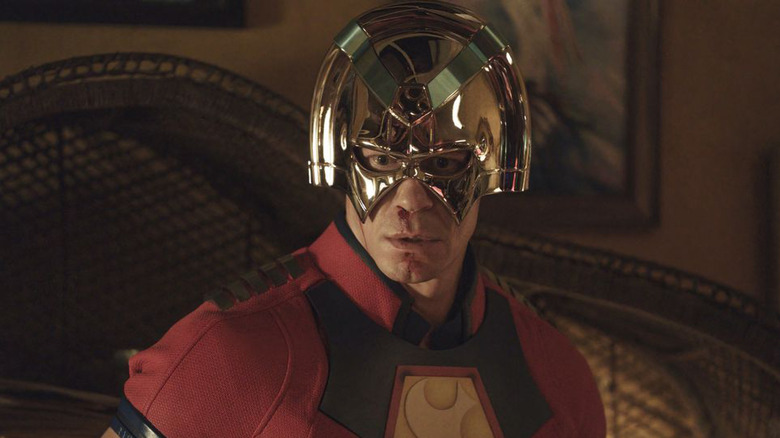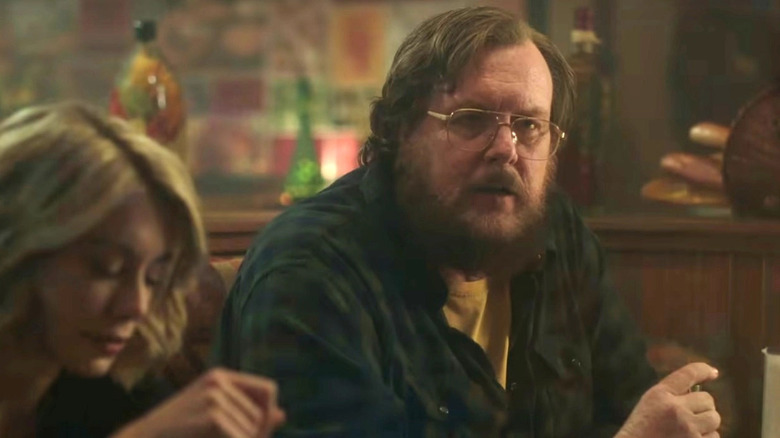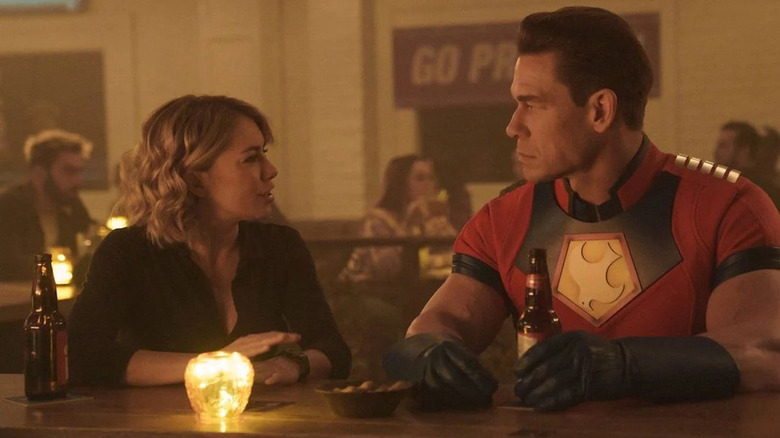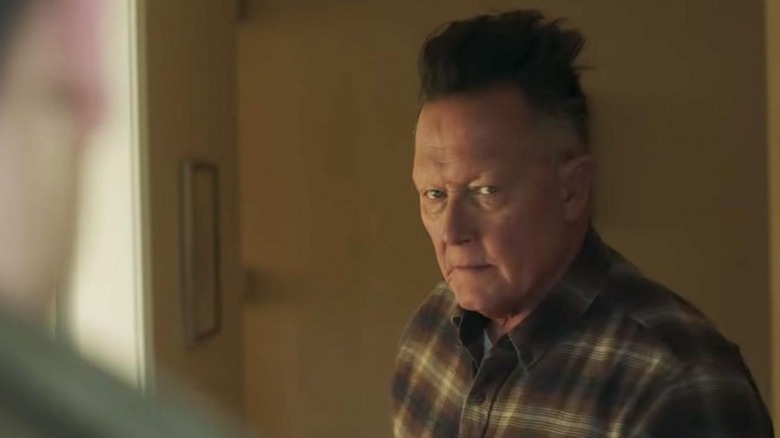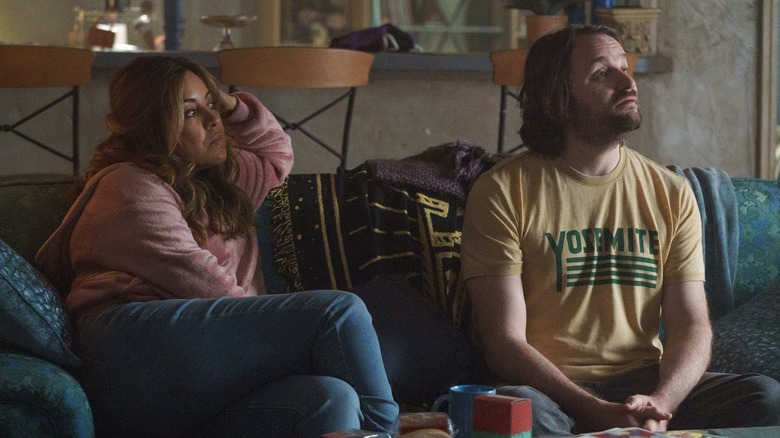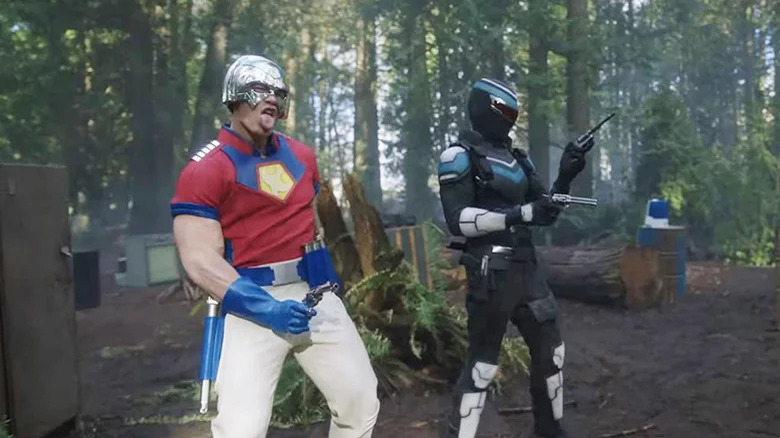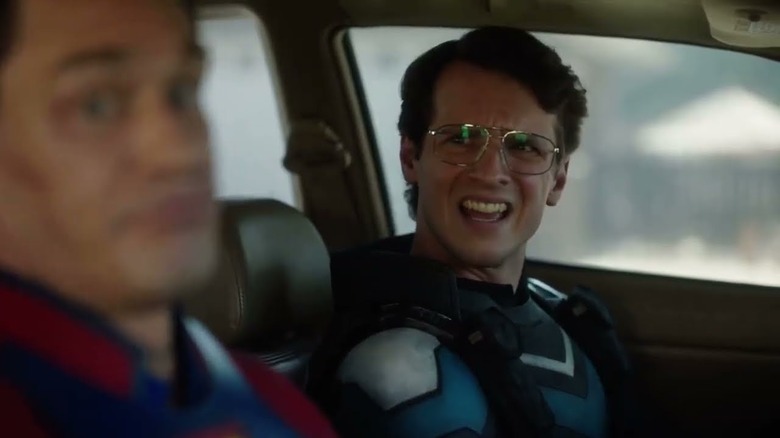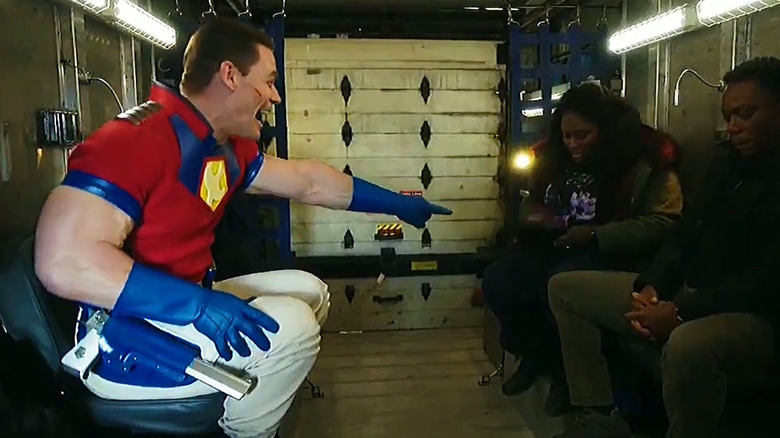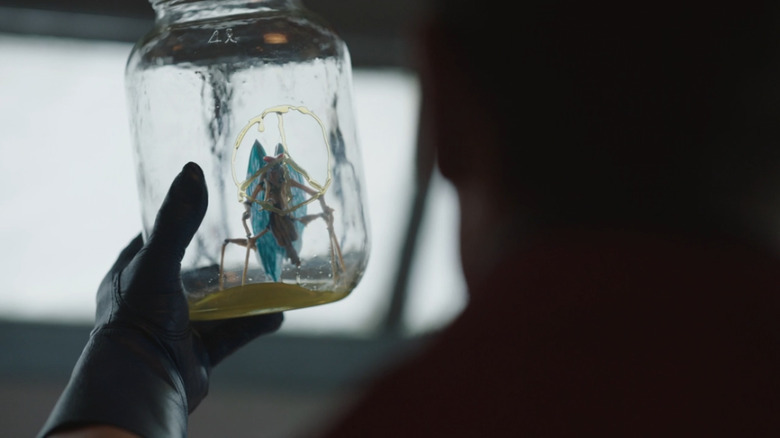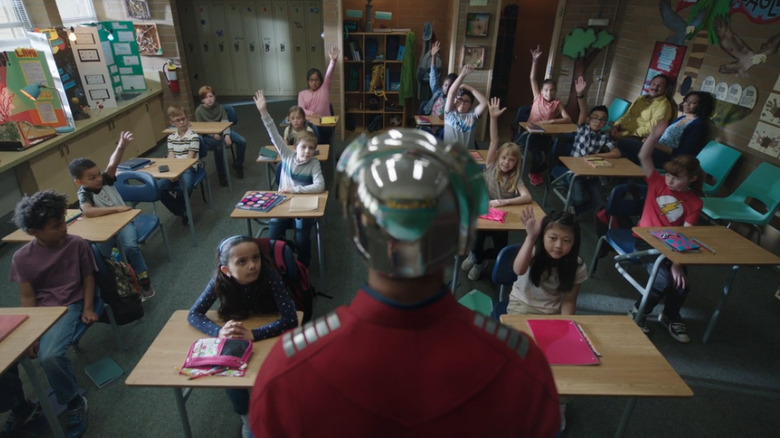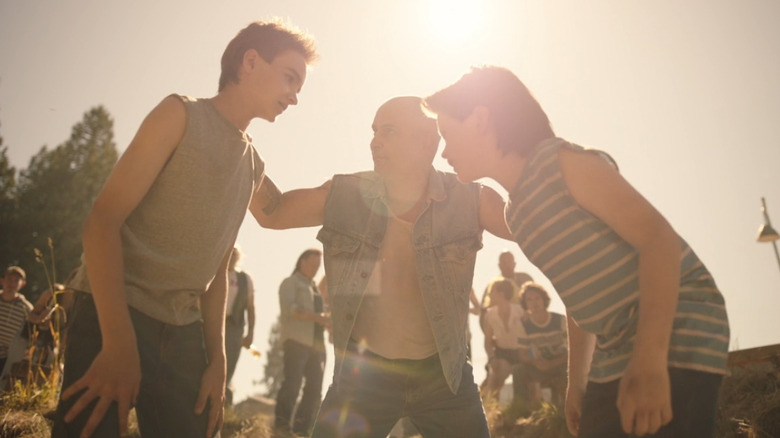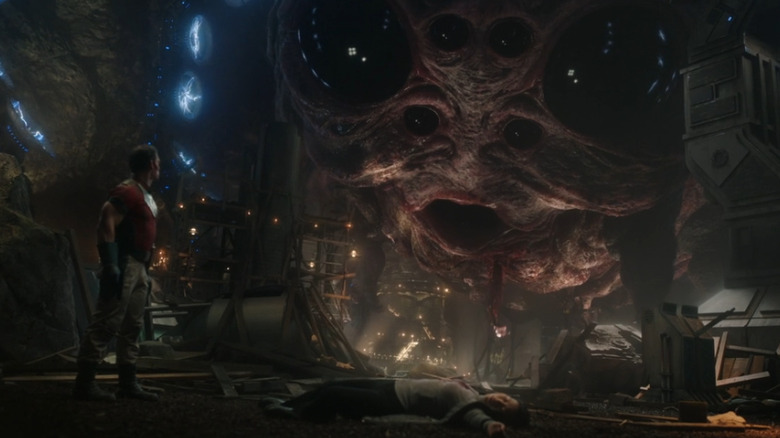Peacemaker's Worst Moments In Season 1
Perhaps the greatest strength of James Gunn's 2021 film "The Suicide Squad" is its eclectic cast of lovable misfit characters. From Bloodshot to King Shark, from Harley Quinn to Ratcatcher 2, pretty much all of them are complex and compelling enough that they could easily support their own spinoff TV series. But in a somewhat puzzling decision, the character that Gunn ultimately decided to give a series to was perhaps the only unlovable misfit in the entire bunch: Peacemaker. Sure, he's a great character, and John Cena plays him perfectly in the film, but he's also a violent and pigheaded bigot, seemingly written to be as detestable as possible at every turn. Would the show be able to make us care about this true villain among villains? And would it even bother trying to redeem him?
Now that the first season is over, we can say that the answers to those two questions, respectively, are "yes" and "kind of." Audiences did indeed get to know quite a bit about Christopher Smith, and ended up caring for him deeply, despite their best efforts. That being said, there's still plenty of times when Peacemaker engages in some utterly heinous behavior, including murder, kidnapping, verbal abuse, and even a bit of sexual harassment. But is any of this to label him as truly irredeemably evil? That's for you to decide. We're just reporting the facts. Today we're running down all the times in Season 1 of Peacemaker when our beloved antihero was at his absolute worst.
Teasing Economos about his beard
Although Peacemaker tends to verbally abuse everyone around him more or less constantly, the member of his team who definitely gets the worst of it is John Economos (Steve Agee). In their first scene together, Peacemaker makes fun of Economos' beard, saying it looks dyed. John vehemently denies this, and its clear that Peacemaker's words have really hurt him, but Peacemaker doesn't let up one bit. Throughout the rest of the season, Peacemaker mocks Economos relentlessly, calling him "Dye-Beard" countless times.
If that wasn't bad enough, all this takes on an additional layer of melancholy when we learn a bit more about Economos in the season finale. Economos has gone undercover, pretending to be an alien "Butterfly" that is possessing a human body, when one of his "fellow aliens" asks him, "The man you've taken over. Why did he do that to his beard?" In order to not break his cover, Economos is forced to admit, "He thought it made him look younger and more handsome. He never had a girlfriend, so he thought dyeing his beard might help." Peacemaker, who is listening in, winces in pain, perhaps finally realizing that his repeated teasing was genuinely hurtful.
Peacemaker does a lot of terrible stuff over the course of the first season, including a ludicrous amount of murders, so making fun of his friend's beard isn't topping the list of his worst offenses, but nonetheless, it's still a real jerk move.
Sort of stalking Harcourt
Among Peacemaker's less forgivable sins is his consistently terrible treatment of women. This is best encapsulated in a moment from Episode 1, when Peacemaker spots his teammate, Emilia Harcourt (Jennifer Holland), entering a dive bar. After a moment's contemplation, Peacemaker decides to follow after her and strike up a conversation. He tries to play off their meeting as a random coincidence, but Harcourt isn't buying it, and calls him out on following her. Chris protests, saying, "When you say it, it makes it sound all stalker-y." Harcourt responds, "No, the way that you did it made it stalker-y. I just described it."
It gets worse from there. Harcourt continues to tell Peacemaker that she's not interested, and he continues to pester her, even explaining the ways in which he wants to have sex with her. Harcourt says, "I'm just trying to have a beer, but ... I guess that's just something I can't have in my life because, I don't know, I wear makeup?" In the end, Harcourt decides to leave the bar, because Chris simply won't leave her alone.
This scene shows that Peacemaker is a classic example of what's known as a "bumbler," a term coined by Lili Loofbourow. A bumbler is a sexual harasser who crosses the line over and over again, and then tries to play it off as awkward ineptitude. And yes, Peacemaker may not be the brightest bulb, but one gets the sense that the reason he's so bad at taking a hint in this particular scene is a more selective form of ignorance. After all, we don't know exactly how old Peacemaker is, but the actor playing him, John Cena, is 44 years old! Assuming Chris Smith is anywhere near that age, he should definitely know better by now.
Turning a blind eye toward Auggie's prejudice
Though many of the characters in Peacemaker are despicable people, the worst of the bunch is clearly Peacemaker's own father, August Smith (Robert Patrick), also known as the "White Dragon." Unlike most DC villains, who engage in somewhat fun and campy forms of evil, the evil that "White Dragon" represents is far too real.
August Smith is openly a white supremacist, and presumably a perpetrator of numerous hate crimes. And yet, Peacemaker doesn't seem to have much of a problem with hanging out and sharing a beer with him. Throughout their first scene together, Auggie constantly spouts hateful rhetoric and even advocates for violence against marginalized groups. Peacemaker sometimes plays along and sometimes just sort of uncomfortably grins, but he only ever pushes back in the most perfunctory fashion. Later, when Vigilante (Freddie Stroma) calls him out on his cozy relationship with his father, the best defense that Chris can offer is, "I don't work with him. He makes me stuff."
To be fair, August was an abusive, controlling father. The power he has over his son's psyche is undeniable, so standing up to him is no easy feat, and Chris does get there eventually. He ultimately turns on his father and shoots him in the head, and he gets some points for that, but the fact that it took him multiple decades to stop constantly seeking this monster's approval doesn't speak all that highly of Peacemaker's moral compass.
Holding a couple hostage
Running down the many crimes that Peacemaker commits across the show's first season, we'd be remiss if we didn't at least mention the kidnapping. In Episode 2, after his ill-fated hookup with a woman who turns out to be a Butterfly, Peacemaker finds himself on the run from the law, trying to escape from an apartment building that has been completely surrounded by cops. He ends up seeking refuge in a random apartment, which ends up being the home of a couple named Evan and Amber.
Peacemaker plans to escape through their balcony, but also decides to tie the two of them to some chairs, just to be on the safe side. And as if things aren't uncomfortable enough, as the three get to talking, there's a bit of a spark between Peacemaker and Amber, due to their mutual love of hair metal. Amber starts to openly flirt with Peacemaker, and this leads to her and Evan getting into a screaming argument as the police are outside their door. Just before Peacemaker makes his exit through their balcony, Amber makes it very clear that she would not mind at all if Peacemaker had his way with her while she was tied up.
Don't get us wrong, kidnapping is still bad — a decidedly un-heroic thing to do — but it probably doesn't count as Peacemaker's number one worst crime if one of his victims at least was extremely into it.
Reminiscing about killing people with Vigilante
One question about Peacemaker that the show never fully answers is just how bad he was at his worst, back in the days when he and Vigilante were "fighting crime" together. How many people did he kill, and how many of them, if any, truly deserved it?
Vigilante reveals a bit about this dark time in Peacemaker's past in Episode 2, when Chris is expressing regret about his previous behavior, and Vigilante tries to cheer him up by saying, "What separates us from other killers is we only kill bad people. Usually. Unless there's a mistake." Given how generally incompetent these two are at most things they try to do, one can assume that these "mistakes" probably happened pretty frequently. After all, in the film "The Suicide Squad," Peacemaker accidentally kills an entire base full of rebels that could have become his allies due to the misconception that they're government agents.
Killing people on accident, however, isn't the only issue here. When Vigilante lists the sorts of people he — and presumably Peacemaker as well — killed on purpose, he includes people who "murdered an innocent person, or sold somebody heroin, or did some graffiti." There's no good way to spin this one. This is some pretty rough stuff.
Allowing Vigilante to be tortured
In Episode 3, Peacemaker and pals are dispatched on their first proper mission. They're supposed to assassinate U.S. Senator Royland Goff, along with his wife and children, because of their belief that they are Butterflies. Peacemaker and Vigilante end up getting captured, and Goff tries to extract some information from Peacemaker by torturing Vigilante in front of him — first by electrocuting him, and then by threatening to cut off a toe.
For most superheroes, this would be the part where they give in, unwilling to let their friend be hurt, but Peacemaker is not most superheroes. He seems completely unphased by Goff's threats and Vigilante's cries of pain. Eventually, Peacemaker is able to escape and shoot Goff in the head, but by the time he does, Vigilante has indeed lost most of one toe.
One might argue that Peacemaker was trying to buy time, or that he didn't have a choice. After all, if he gave Goff what he wanted, their captor may have just executed them. This explanation is harder to believe, however, when you consider Peacemaker's demeanor, both during this scene and after: He just didn't seem all that bothered by it. He never apologizes to Vigilante, and when VIgilante tries to fish for an apology, Peacemaker just seems confused, as if he never even considered his sidekick's feelings at all.
Mocking Adebayo's nude photo blunder
One of Peacemaker's crassest moments is his rather un-gracious reaction to a certain embarrassing mistake made by one of his teammates during Episode 3. As the group is riding in a van toward their next objective, Leota Adebayo (Danielle Brooks) leads the mission briefing, scrolling through relevant photos using her tablet. Suddenly, a very private picture slides onto Leota's screen, one from her wife that was clearly meant for Leota's eyes only.
Everyone else goes silent with shock, but Peacemaker immediately starts howling with laughter. Adebayo tries her best to offer an explanation, saying that she and her wife have been "experimenting with new forms of intimacy." The rest of the group seems willing to ignore her flub and move on, but Peacemaker won't let her off that easily. He continues to cackle with delight and taunt Adebayo mercilessly, including a bit where he awkwardly attempts to insult her for being a lesbian.
This is clearly a moment when no one is at their best. Adebayo certainly made a rather large faux pas as well, but at least hers was an accident. Rather than showing her compassion, Peacemaker acted like ... well, Peacemaker, and dumped a giant scoop of cruelty on his friend, mixed with a dash of homophobia. It's downright impressive that by the end of that scene, even given how badly Adebayo messed up, Peacemaker still found a way to somehow be the biggest jerk in that van.
Keeping Goff alive
Many of Peacemaker's worst moments involve killing people, but this next example shows that sometimes not killing someone can be just as bad. In Episode 3, Peacemaker is tasked with assassinating Senator Royland Goff — and in the end, he momentarily seems to have succeeded when he shoots Goff in the head. However, moments later, something emerges from the gunshot wound: the alien "Butterflies" that was controlling the senator's body. When he later reunites with the rest of his team, he claims to have killed it, but it's eventually revealed that Chris chose to spare the Butterfly, and keep it in a glass jar like a pet.
This one act of mercy would go on to have dire ramifications. The Butterfly eventually escapes from his little glass prison and claims a new host: Detective Song. Then, while puppetting Song's body, the Butterfly leads an army of its kind to kill and replace an entire police station full of cops. Then, Chris's former "pet" tracks down and kills Peacemaker's handler, Clemson Murn (Chukwudi Iwuji).
As bad as the consequences of this decision ended up being, it's hard to fault Peacemaker too much for this one. Sparing Goff was a rare act of mercy on Chris's part, and given his usual track record, that's downright commendable. That being said, you still have to admit that Peacemaker could have saved countless lives if he had just squashed that bug when he had the chance.
Giving a very adult talk to a classroom full of kids
Now for a more lighthearted example of Peacemaker's awfulness. In Episode 6, Peacemaker visits a classroom full of children as a favor to his janitor pal Jamil, but as you might imagine, the presentation that he gives is not exactly family-friendly. He refers to the kids with monikers such as "kid with the sad eyes," "chubster," and "gender-swapped Alfred E. Neuman," and he also argues with them, slips in some borderline foul language, and makes some barely veiled allusions to sex.
It's far from the worst examples of Peacemaker's tactlessness, but simply because this is a time when he should theoretically be on his best behavior, this whole ordeal ends up serving as a sort of case study that helps us better understand the general baseline level of jerkiness that Peacemaker is constantly radiating at all times. Peacemaker is casually and thoughtlessly mean to these kids for no reason at all, and there's also surprisingly little malice in the things he says. Instead, we see that he operates with a sort of reflexive cruelness, spouting out every terrible thought that pops into his twisted mind with no filter.
The fact that these kids also have no filter helps reveal another interesting aspect of Peacemaker's rudeness, which is that it gets notably worse whenever he is asked prying questions that rub up against his many insecurities — perhaps as a defense mechanism to keep them from seeing him too clearly.
Killing his brother
We see Peacemaker do all sorts of terrible things over the course of the show's first season, but in Episode 7, we learn about the sin that he himself is the most ashamed of, killing his brother Keith in a fistfight. But is this really the worst thing he's ever done? For most people, killing their own brother would definitely top the list of their worst moments. In Peacemaker's case though, there are several major mitigating factors to consider.
First, Chris was just a child at the time. Second, his father was the one pushing them to fight, and he was goading Chris into being more violent, saying things like, "... get in there and hit him." And third, it was clearly just a freak accident. Maybe Chris happened to hit his brother's head in just the right spot. Maybe Keith broke something important when he hit the ground. Chris never gets an answer, and neither does the audience. It's just one of those things that happens.
All things considered, this is perhaps the only case where Peacemaker truly didn't do anything wrong, and should definitely forgive himself. He should feel far less guilty for the death of Keith, and far more guilty for all his other misdeeds, because he's done many far worse things, on purpose, as an adult, since then.
Killing the Cow
This next one is complicated. In the season finale, Peacemaker has finally located the mysterious food source of his alien foes, a gargantuan organism known as "the Cow." But before he gets a chance to destroy it, he learns an uncomfortable truth that gives him pause. Yes, the Butterflies do, in fact, want to conquer the planet, but believe it or not, it's for quite noble reasons. They came from a planet that was once very much like Earth, but they destroyed it with rampant short-term thinking and greed. They claim that a similar fate is inevitable for humanity unless someone takes control of the Earth and starts making the hard decisions for us. Peacemaker then has to decide whether or not he still wants to destroy their food source, now with the knowledge that they might be the only way to save us.
In the end, Peacemaker kills the Cow, freeing the Earth and dooming the Butterflies to extinction. He later gives the justification that, regardless of whether or not it was the right thing to align himself with the Butterflies, if he had, they would have killed the rest of his team, and Peacemaker wasn't willing to let that happen. Beyond that, he doesn't seem particularly interested in contemplating the greater moral ramifications of this decision — perhaps because he didn't feel qualified to make it in the first place.
Did he make the right choice? It's kind of impossible to say. It's undeniable that this was the most important decision Peacemaker made over the course of the first season, but we may never know whether it was truly an example of him at his worst, or at his best.
